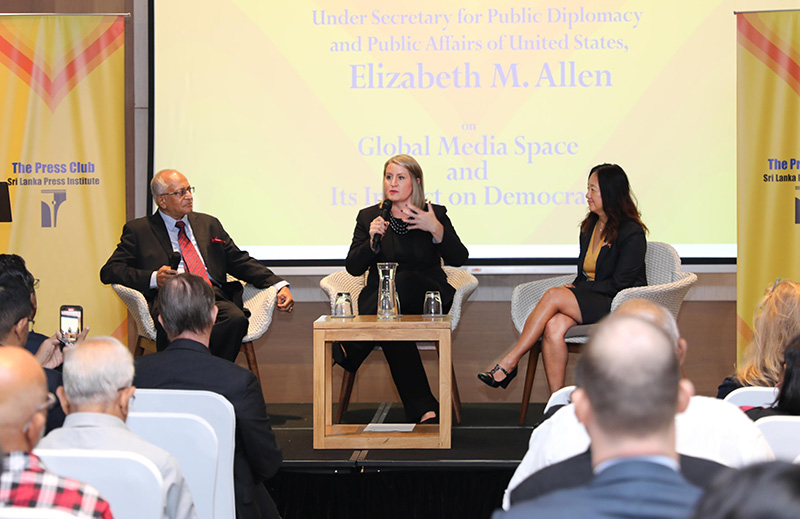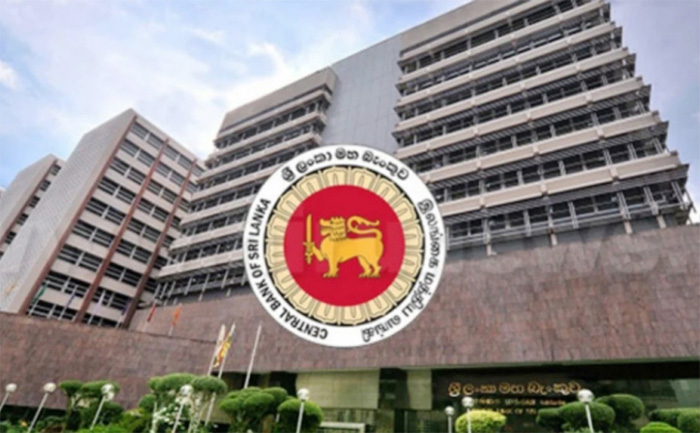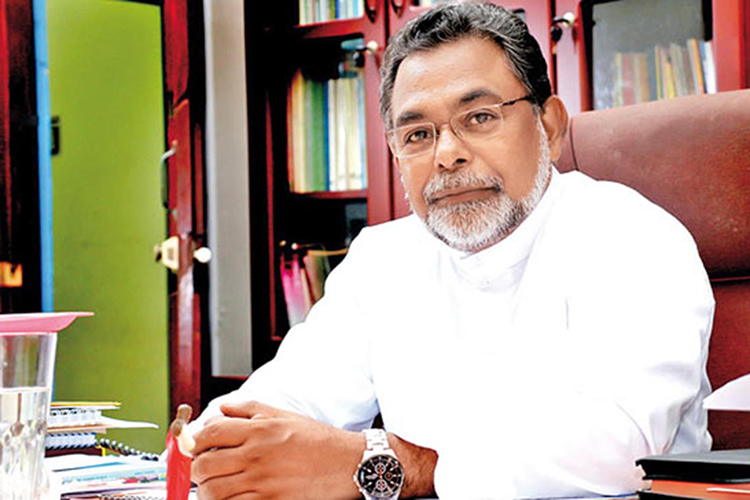News
US backs Lankan journalists vis-a-vis Online Safety law

Under Secretary of State for Public Diplomacy Elizabeth Allen on Monday (19) declared US support for journalists here against the backdrop of enactment of ‘Online Safety Bill’
She spokes about press freedom and related issues at the Sri Lanka Press Institute Press Club.
A statement issued by the US Embassy quoted Allen as having said the U.S. Embassy is all in on supporting your incredible work. Sure, we might bump heads over a story now and then, but above all, we’re your biggest fans. We’re all in on programmes that hone your skills because we believe in your right to pursue journalism freely and fearlessly.
I want to thank you for protecting the rights and freedoms of journalists here in Sri Lanka and around the world, ensuring all citizens enjoy the right to express their ideas and opinions openly and freely. Even in difficult times, you continue to press forward and ask difficult questions. Your commitment to seeking out the truth and shouting it from the rooftops remains a democratic staple, and I truly appreciate what you do.
It’s only fitting that I begin my remarks this afternoon by telling a story that I think is relevant in light of today’s topic about the media’s role in a democracy.
Over a century ago, American media coined the term “muckraker” for journalists who delved into societal issues, exposing corruption.
Although the term carried a somewhat negative connotation, labeling these journalists as mere “gossip mongers,” today, we honor them as the pioneers of investigative journalism.
These muckrakers played a pivotal role in ushering in the Progressive Era, a time of significant social and political reform in American history.
Even President Theodore Roosevelt referred to them as “muckrakers,” criticizing their focus on society’s flaws through figures like Lincoln Steffens, whose work shed light on corruption and spurred a nationwide call for accountability and reform.
Steffens’ book ‘The Shame of the Cities,’ published in 1904, made him renowned for uncovering corruption within American cities, highlighting the nefarious links between political leaders, businesses, and organized crime.
His fearless journalism raised critical awareness about the urgent need for governmental and corporate accountability. Steffens wasn’t acting as a public relations officer for the government; his role was to uncover the truth; however unpleasant it might be.
Faced with the stark realities Steffens presented, American officials and the public were compelled to confront a pivotal question: ‘Is this the kind of country we aspire to be?’ The resounding answer was no.
Steffens’ work didn’t just expose wrongdoing; it sparked a nationwide demand for reform and played a crucial role in fostering a dialogue about the essential role of investigative journalism in ensuring power remains accountable.
This story showcases how freedom of the press and freedom of expression are not just fundamental human rights, they are also vital contributors to a country’s development and growth.
This brings me to my main point: how the global media space supports democracy and fosters peaceful, just, and inclusive societies.
In my mind, the correlation is obvious: When a government constricts the rights and freedoms of its citizens, the future and the development of the country will naturally suffer.
Globally, we’re witnessing serious and escalating challenges to media freedom. The United States stands firmly for the freedom of expression, advocating for press freedom both online and offline, and ensuring the safety of journalists and media workers worldwide. Unfortunately, these essential freedoms are under threat globally, including concerns raised here in Sri Lanka.
When governments intensify efforts to withhold information from the public by restricting internet access and censoring content, we must speak up. Notably, when Sri Lanka’s Parliament passed the Online Safety Bill in January, the United States voiced concerns over its potential effects on freedom of expression, innovation, and privacy.
It’s common to hear arguments against unfettered freedom of expression. Critics claim the media is biased, aiming to embarrass governments and undermine public trust. Others worry that without checks, freedom of expression may fuel the spread of misinformation. Some argue that an unchecked press can incite tension and compromise security. And there’s concern that continuous reports on corruption, violence, and political strife can tarnish a nation’s image, deterring investment and hampering development.
However, the media’s bias should lean towards the public’s interest, acting as a guardian to ensure that leaders fulfill their duties. This principle holds in Sri Lanka, the United States, and globally.
The challenge of negative press, often labeled as “fake news” or “biased journalism,” is not new. For generations, governments and the media have navigated a complex, sometimes adversarial relationship. This dynamic isn’t unique to any one nation; in the United States, for instance, presidents from both major political parties have experienced their share of friction with the press. This tension, a hallmark of democratic societies, plays a crucial role in fostering transparency and encouraging effective governance. It’s a familiar scene: politicians and journalists engage in heated exchanges, especially when leaders feel their actions are misrepresented, leading to accusations of inaccuracies and biased reporting.
The press’s duty is to deliver facts as they stand, shedding light on the government’s achievements as well as spotlighting areas where policies or programs fall short. This transparency not only informs the public but also strengthens the nation as it encourages constructive action and improvement.
And suppressing voices only complicates matters further. Attempting to conceal issues rather than addressing them is akin to hiding a broken tool rather than fixing it. True progress comes from collaborative dialogue, even if it means embracing the messiness of public discourse.”
News
CEB engineers raise alarm over power sector stability

A senior electrical engineers attached to the Ceylon Electricity Board (CEB) have warned that unresolved structural and policy issues within the power sector could threaten the long-term stability of the national grid, urging authorities to act swiftly to address mounting technical and administrative concerns.
Speaking on condition of anonymity, they said the electricity network was operating under increasing strain due to delayed infrastructure upgrades, financial constraints, and growing demand.
“The national grid is not something that can be managed casually. It requires systematic planning, preventive maintenance, and timely investment. If these are compromised, the risk to system stability increases,” the engineers said.
They noted that several transmission and substation modernisation projects were behind schedule, while ageing thermal plants continued to shoulder a significant portion of the country’s base load demand.
“Engineers are committed to ensuring an uninterrupted supply. But professional expertise must be respected in decision-making. Technical matters cannot be subjected to short-term political considerations,” the engineers added.
Meanwhile, the powerful Ceylon Electricity Board Engineers’ Union (CEBEU) echoed similar concerns, warning that failure to address long standing professional and structural issues could have serious consequences for the power sector.
In a statement, the CEBEU has said that engineers have repeatedly called for reforms that safeguard the integrity of the utility and ensure that operational decisions remain grounded in technical evaluation.
“The electricity sector is a critical national asset. Any attempt to weaken institutional safeguards or bypass professional consultation will directly impact service reliability and long-term sustainability,” the union said.
The CEBEU has stressed the importance of transparent engagement between policymakers and technical personnel, noting that morale among engineers could be affected if their concerns continue to go unheard.
Industry analysts point out that the power sector plays a central role in Sri Lanka’s economic recovery efforts, particularly as the country seeks to expand industrial activity and attract investment. Stability in electricity supply remains a key determinant of business confidence.
The senior engineer stressed d that the objective of raising concerns is not confrontation but preservation of the grid’s integrity.
“Our responsibility is to the public. Electricity powers hospitals, industries, and homes. Safeguarding the system is a national duty,” he said.
With tensions simmering within the sector, stakeholders say meaningful dialogue between authorities, engineers, and trade unions will be crucial in ensuring that Sri Lanka’s power infrastructure remains resilient in the face of growing challenges.
By Ifham Nizam
News
CB identifies 24 pyramid scams in Sri Lanka

The Central Bank (CBSL) yesterday announced that investigations had identified 24 companies and applications operating prohibited pyramid schemes.
In a public notice issued under Section 83C of the Banking Act, No. 30 of 1988 (as amended), the CBSL said the following entities had been “ascertained and determined as prohibited schemes”: Tiens Lanka Health Care (Pvt) Ltd, Best Life International (Pvt) Ltd, Mark–Wo International (Pvt) Ltd, V M L International (Pvt) Ltd, Global Lifestyle Lanka (Pvt) Ltd, Fast3Cycle International (Pvt) Ltd, Sport Chain App / Sport Chain ZS Society Sri Lanka, OnmaxDT, MTFE App / MTFE SL Group / MTFE Success Lanka / MTFE DSCC Group, Fastwin (Pvt) Ltd, Fruugo Online App / Fruugo Online (Pvt) Ltd, Ride to Three Freedom (Pvt) Ltd, Qnet / Questnet, Era Miracle (Pvt) Ltd and Genesis Business School, Ledger Block, Isimaga International (Pvt) Ltd, Beecoin App and Sunbird Foundation, Windex Trading, The Enrich Life (Pvt) Ltd, Smart Win Entrepreneur (Pvt) Ltd, Net Fore International (Pvt) Ltd / Netrrix, Pro Care (Pvt) Ltd and Shade of Procare (Pvt) Ltd, SGO / sgomine.com and I.C.A.N Advertising (Pvt) Ltd and its affiliates icanonlineadvertising.com, bannercuts.com, bannercuts.lk, bannercuts.net and bannercuts.org
The CBSL said pyramid schemes, also referred to as multi-level marketing or direct selling schemes in certain instances, operate as recruitment-based programmes in which members enlist others into an expanding “downline” structure resembling a chain letter.
Under such arrangements, a portion of the fees paid by new recruits is channelled upwards to earlier participants, known as the “upline”, who are fewer in number.
The Central Bank warned that such schemes are inherently unsustainable, with the vast majority of participants at the lower tiers eventually losing their investments, while only a small number of early entrants are able to recover or profit from the funds contributed by subsequent recruits. It noted that when a pyramid scheme collapses, up to 99 per cent of those in the lower levels risk losing their money.
News
Church urges patience, warns against interference with Easter attacks probe

Director of Communications for the Archdiocese of Colombo, Rev. Fr. Cyril Gamini Fernando, yesterday expressed confidence that ongoing investigations into the 2019 Easter Sunday terror attacks would yield meaningful results and urged the public and all stakeholders to exercise patience and allow the probe to proceed independently.
Addressing a media briefing in Colombo yesterday, Fr. Fernando called on all parties to refrain from interfering with the investigations, warning that any attempt to obstruct the process would amount to a grave injustice to the victims.
He said he believed there was credible evidence to warrant the arrest of military intelligence veteran Maj. Gen. (Retd.) Suresh Sallay.
Referring to the coordinated bombings on April 21, 2019, which targeted churches and hotels and claimed nearly 300 lives, Fr. Fernando described the attacks as a “barbaric” act and a “massacre” that killed worshippers attending Easter services as well as individuals from different religious and ethnic communities.
By Norman Palihawadane
-

 Features6 days ago
Features6 days agoWhy does the state threaten Its people with yet another anti-terror law?
-

 Features6 days ago
Features6 days agoReconciliation, Mood of the Nation and the NPP Government
-

 Features6 days ago
Features6 days agoVictor Melder turns 90: Railwayman and bibliophile extraordinary
-

 Features5 days ago
Features5 days agoLOVEABLE BUT LETHAL: When four-legged stars remind us of a silent killer
-

 Features6 days ago
Features6 days agoVictor, the Friend of the Foreign Press
-

 Business5 days ago
Business5 days agoSeeing is believing – the silent scale behind SriLankan’s ground operation
-

 Business5 days ago
Business5 days agoBathiya & Santhush make a strategic bet on Colombo
-

 Features6 days ago
Features6 days agoBarking up the wrong tree













